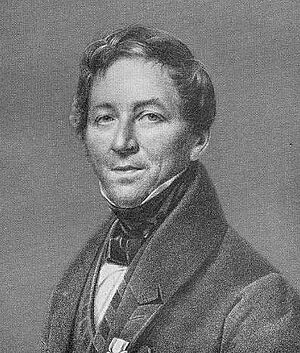August Böckh facts for kids
Quick facts for kids
August Böckh
|
|
|---|---|
 |
|
| Born | 24 November 1785 Karlsruhe, Margraviate of Baden
|
| Died | 3 August 1867 (aged 81) |
| Nationality | German |
| Other names | August Boeckh |
| Awards | Prussian Academy of Sciences |
| Academic background | |
| Alma mater | University of Halle |
| Academic advisors | Johann August Ernesti Friedrich Schleiermacher |
| Influences | Friedrich Schleiermacher Friedrich August Wolf |
| Academic work | |
| School or tradition | Hermeneutics Methodological hermeneutics |
| Institutions | University of Heidelberg University of Berlin |
| Notable students | Wilhelm Dilthey F. A. Trendelenburg |
| Main interests | Philology |
| Notable works | Gesammelte kleine Schriften |
| Influenced | Johann Gustav Droysen Wilhelm Dilthey Wilhelm Wackernagel |
August Böckh (born November 24, 1785 – died August 3, 1867) was an important German classical scholar. He was an expert in ancient history and cultures. Böckh spent his life studying the ancient world, especially Ancient Greece. He helped shape how people studied history and languages.
Contents
Who Was August Böckh?
August Böckh was born in Karlsruhe, a city in Germany. From a young age, he showed a great interest in learning. He went to a local school called a gymnasium, which prepared students for university.
Early Life and Education
In 1803, August Böckh started studying theology (the study of religion) at the University of Halle. However, his path soon changed. A famous professor named Friedrich August Wolf taught there. Wolf was very passionate about studying ancient Greek and Roman times. Böckh was inspired by Wolf and switched his focus to philology. Philology is the study of language in historical sources. Böckh became one of Wolf's best students.
A Career in Academia
After finishing his studies, Böckh began his teaching career. In 1807, he became a Privatdozent at the University of Heidelberg. This means he was a private lecturer who could teach at the university. Soon after, he became a professor.
In 1811, Böckh moved to the new University of Berlin. He was appointed a professor of classical literature and public speaking. He stayed at this university for the rest of his life. In 1814, he was chosen to be a member of the Prussian Academy of Sciences. This was a very important group of scholars. He also served as its secretary for many years. August Böckh passed away in Berlin in 1867 when he was 81 years old.
What is Philology?
August Böckh had a special way of looking at philology. Before him, many thought it was just about knowing words and fixing old texts. But Böckh believed philology was much bigger. He saw it as understanding all of ancient times. This included history, philosophy, and culture.
He thought philology should cover five main areas:
- Public life, laws, and government of ancient people.
- Private life and daily customs.
- Religions and arts.
- Ideas, beliefs, and literature.
- A full understanding of their language.
Böckh believed that studying all these parts together gave a complete picture of ancient civilizations. He thought that even though it was a huge task, it was important for scholars to try.
Studying Ancient Greece
Böckh was very active in his studies and writing. One of his most famous works was an edition of the poems by Pindar. Pindar was a famous ancient Greek poet. Böckh's work included a detailed study of Pindar's metres. Metres are the patterns of rhythm in poetry. Böckh showed how Greek music and poetry were closely linked. He studied ancient Greek music and instruments to understand the rhythms better. This helped create a scientific way to study Greek poetry.
Another important work by Böckh was Die Staatshaushaltung der Athener. This book was about how ancient Athens managed its money and public services. He gathered information from many Greek writings. He was very careful to check if the information was reliable. This book showed his amazing skill in understanding difficult historical topics.
Uncovering Ancient History
Böckh also worked on a huge project called Corpus Inscriptionum Graecarum. This was a collection of ancient Greek writings found on stones and other objects. These inscriptions give us direct clues about life in ancient times. Böckh was the main editor for this massive work. It helped scholars learn much more about Greek history.
He also became a leading expert on ancient chronology. Chronology is the study of how events are ordered in time. He studied ancient calendars and time cycles. His work helped historians figure out exact dates for events in the past.
Thinking About Philosophy
Böckh was also interested in philosophy. He wrote about the ideas of the famous Greek philosopher Plato. For example, he studied Plato's ideas about the universe and astronomy. He also wrote about other ancient Greek thinkers.
Böckh's many writings and lectures were collected into several volumes. These works continue to be important for people who study ancient history and languages today.
Works
- Philolaos des Pythagoreers Lehren nebst den Bruchstücken seines Werkes (1819)
See also

